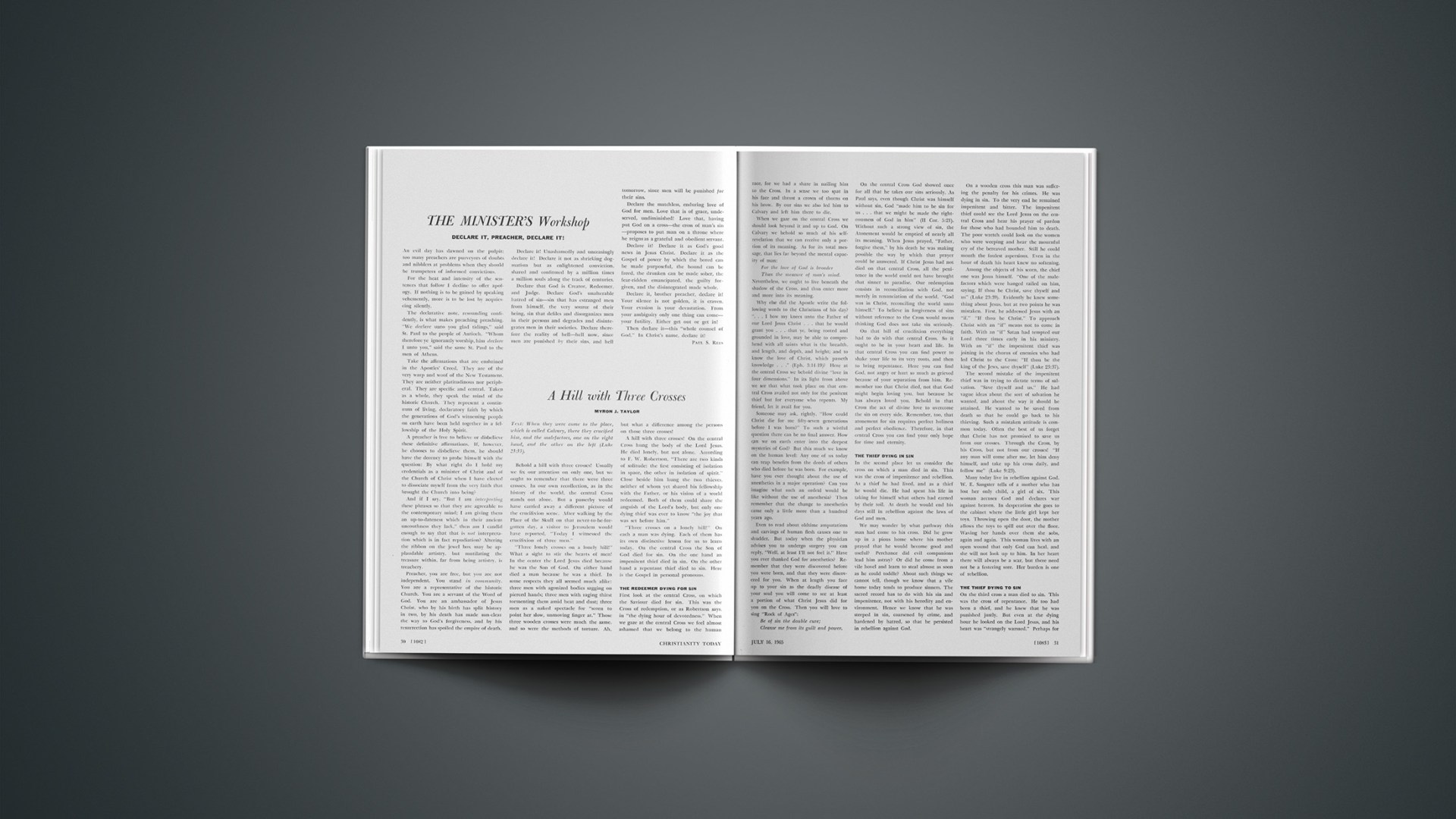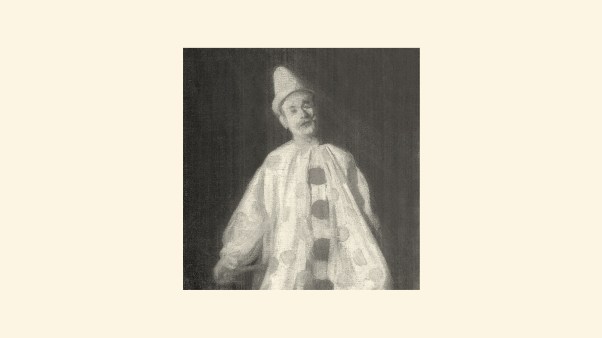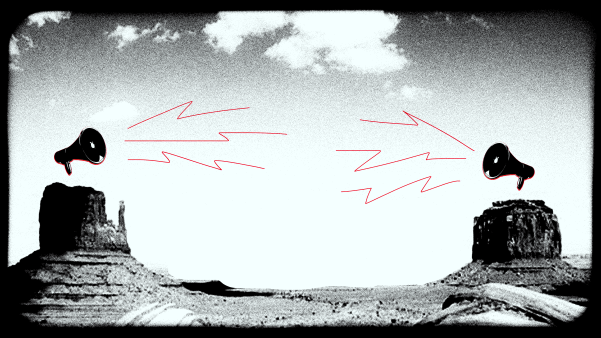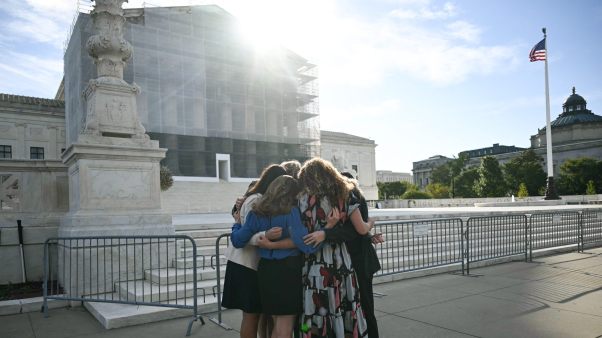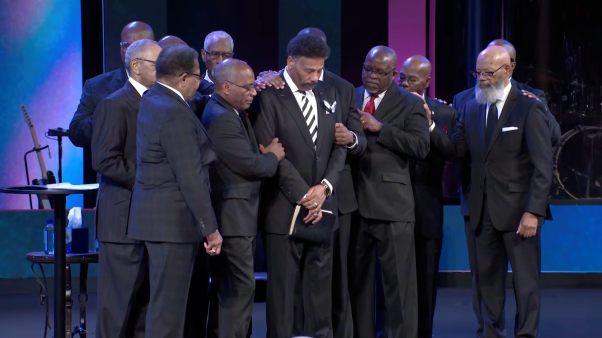Text: When they were come to the place, which is called Calvary, there they crucified him, and the malefactors, one on the right-hand, and the other on the left (Luke 23:33).
Behold a hill with three crosses! Usually we fix our attention on only one, but we ought to remember that there were three crosses. In our own recollection, as in the history of the world, the central Cross stands out alone. But a passerby would have carried away a different picture of the crucifixion scene. After walking by the Place of the Skull on that never-to-be-forgotten day, a visitor to Jerusalem would have reported, “Today I witnessed the crucifixion of three men.”
“Three lonely crosses on a lonely hill!” What a sight to stir the hearts of men! In the center the Lord Jesus died because he was the Son of God. On either hand died a man because he was a thief. In some respects they all seemed much alike: three men with agonized bodies sagging on pierced hands; three men with raging thirst tormenting them amid heat and dust; three men as a naked spectacle for “scorn to point her slow, unmoving finger at.” Those three wooden crosses were much the same, and so were the methods of torture. Ah, but what a difference among the persons on those three crosses!
A hill with three crosses! On the central Cross hung the body of the Lord Jesus. He died lonely, but not alone. According to F. W. Robertson, “There are two kinds of solitude: the first consisting of isolation in space, the other in isolation of spirit.” Close beside him hung the two thieves, neither of whom yet shared his fellowship with the Father, or his vision of a world redeemed. Both of them could share the anguish of the Lord’s body, but only one dying thief was ever to know “the joy that was set before him.”
“Three crosses on a lonely hill!” On each a man was dying. Each of them has its own distinctive lesson for us to learn today. On the central Cross the Son of God died for sin. On the one hand an impenitent thief died in sin. On the other hand a repentant thief died to sin. Here is the Gospel in personal pronouns.
The Redeemer Dying For Sin
First look at the central Cross, on which the Saviour died for sin. This was the Cross of redemption, or as Robertson says, in “the dying hour of devotedness.” When we gaze at the central Cross we feel almost ashamed that we belong to the human race, for we had a share in nailing him to the Cross. In a sense we too spat in his face and thrust a crown of thorns on his brow. By our sins we also led him to Calvary and left him there to die.
When we gaze on the central Cross we should look beyond it and up to God. On Calvary we behold so much of his self-revelation that we can receive only a portion of its meaning. As for its total message, that lies far beyond the mental capacity of man:
For the love of God is broader
Than the measure of man’s mind.
Nevertheless, we ought to live beneath the shadow of the Cross, and thus enter more and more into its meaning.
Why else did the Apostle write the following words to the Christians of his day? “… I bow my knees unto the Father of our Lord Jesus Christ … that he would grant you … that ye, being rooted and grounded in love, may be able to comprehend with all saints what is the breadth, and length, and depth, and height; and to know the love of Christ, which passeth knowledge …” (Eph. 3:14–19)? Here at the central Cross we behold divine “love in four dimensions.” In its light from above we see that what took place on that central Cross availed not only for the penitent thief but for everyone who repents. My friend, let it avail for you.
Someone may ask, rightly, “How could Christ die for me fifty-seven generations before I was born?” To such a wistful question there can be no final answer. How can we on earth enter into the deepest mysteries of God? But this much we know on the human level: Any one of us today can reap benefits from the deeds of others who died before he was born. For example, have you ever thought about the use of anesthetics in a major operation? Can you imagine what such an ordeal would be like without the use of anesthesia? Then remember that the change to anesthetics came only a little more than a hundred years ago.
Even to read about oldtime amputations and carvings of human flesh causes one to shudder. But today when the physician advises you to undergo surgery you can reply, “Well, at least I’ll not feel it.” Have you ever thanked God for anesthetics? Remember that they were discovered before you were born, and that they were discovered for you. When at length you face up to your sin as the deadly disease of your soul you will come to see at least a portion of what Christ Jesus did for you on the Cross. Then you will love to sing “Rock of Ages”:
Be of sin the double cure;
Cleanse me from its guilt and power.
On the central Cross God showed once for all that he takes our sins seriously. As Paul says, even though Christ was himself without sin, God “made him to be sin for us … that we might be made the righteousness of God in him” (2 Cor. 5:21). Without such a strong view of sin, the Atonement would be emptied of nearly all its meaning. When Jesus prayed, “Father, forgive them,” by his death he was making possible the way by which that prayer could be answered. If Christ Jesus had not died on that central Cross, all the penitence in the world could not have brought that sinner to paradise. Our redemption consists in reconciliation with God, not merely in renunciation of the world. “God was in Christ, reconciling the world unto himself.” To believe in forgiveness of sins without reference to the Cross would mean thinking God does not take sin seriously.
On that hill of crucifixion everything had to do with that central Cross. So it ought to be in your heart and life. In that central Cross you can find power to shake your life to its very roots, and then to bring repentance. Here you can find God, not angry or hurt so much as grieved because of your separation from him. Remember too that Christ died, not that God might begin loving you, but because he has always loved you. Behold in that Cross the act of divine love to overcome the sin on every side. Remember, too, that atonement for sin requires perfect holiness and perfect obedience. Therefore, in that central Cross you can find your only hope for time and eternity.
The Thief Dying In Sin
In the second place let us consider the cross on which a man died in sin. This was the cross of impenitence and rebellion. As a thief he had lived, and as a thief he would die. He had spent his life in taking for himself what others had earned by their toil. At death he would end his days still in rebellion against the laws of God and men.
We may wonder by what pathway this man had come to his cross. Did he grow up in a pious home where his mother prayed that he would become good and useful? Perchance did evil companions lead him astray? Or did he come from a vile hovel and learn to steal almost as soon as he could toddle? About such things we cannot tell, though we know that a vile home today tends to produce sinners. The sacred record has to do with his sin and impenitence, not with his heredity and environment. Hence we know that he was steeped in sin, coarsened by crime, and hardened by hatred, so that he persisted in rebellion against God.
On a wooden cross this man was suffering the penalty for his crimes. He was dying in sin. To the very end he remained impenitent and bitter. The impenitent thief could see the Lord Jesus on the central Cross and hear his prayer of pardon for those who had hounded him to death. The poor wretch could look on the women who were weeping and hear the mournful cry of the bereaved mother. Still he could mouth the foulest aspersions. Even in the hour of death his heart knew no softening.
Among the objects of his scorn, the chief one was Jesus himself. “One of the malefactors which were hanged railed on him, saying, If thou be Christ, save thyself and us” (Luke 23:39). Evidently he knew something about Jesus, but at two points he was mistaken. First, he addressed Jesus with an “if.” “If thou be Christ.” To approach Christ with an “if” means not to come in faith. With an “if” Satan had tempted our Lord three times early in his ministry. With an “if” the impenitent thief was joining in the chorus of enemies who had led Christ to the Cross: “If thou be the king of the Jews, save thyself” (Luke 23:37).
The second mistake of the impenitent thief was in trying to dictate terms of salvation. “Save thyself and us.” He had vague ideas about the sort of salvation he wanted, and about the way it should be attained. He wanted to be saved from death so that he could go back to his thieving. Such a mistaken attitude is common today. Often the best of us forget that Christ has not promised to save us from our crosses. Through the Cross, by his Cross, but not from our crosses! “If any man will come after me, let him deny himself, and take up his cross daily, and follow me” (Luke 9:23).
Many today live in rebellion against God. W. E. Sangster tells of a mother who has lost her only child, a girl of six. This woman accuses God and declares war against heaven. In desperation she goes to the cabinet where the little girl kept her toys. Throwing open the door, the mother allows the toys to spill out over the floor. Waving her hands over them she sobs, again and again. This woman lives with an open wound that only God can heal, and she will not look up to him. In her heart there will always be a scar, but there need not be a festering sore. Her burden is one of rebellion.
The Thief Dying To Sin
On the third cross a man died to sin. This was the cross of repentance. He too had been a thief, and he knew that he was punished justly. But even at the dying hour he looked on the Lord Jesus, and his heart was “strangely warmed.” Perhaps for the first time in all his life he began to see things in their true light.
First of all, in the presence of the dying Redeemer this other thief admitted the justice of his sufferings and death. Speaking to the other thief, this one asked, “Dost thou not fear God, seeing thou art in the same condemnation? And we indeed justly; for we receive the due reward of our deeds: but this man hath done nothing amiss” (Luke 23:40, 41). How difficult it is for a stubborn heart to acknowledge its own sin!
This dying thief called on Jesus, but he made no demands. However, he did humbly request a gift of mercy. “Lord, remember me when thou comest into thy kingdom.” This man dying to sin must have seen in the Lord Jesus something not of this world. He had watched Jesus being nailed to the Cross, and as he heard the strokes of the hammer he had seen the blood stream forth. But from those lips the dying thief did not hear any such curses as were customary on Calvary. Rather did he hear a prayer for pardon, a prayer that “shivered the sky and thrust itself into his soul,” as nothing had ever done through all his years. “Father, forgive them; for they know not what they do.”
In response to his own humble cry of faith the penitent thief received a promise infinitely precious. “Today shalt thou be with me in paradise.” He found that in Christ there was hope for any man, no matter what he had done, if only he truly repented. He discovered that while Roman power had done all it could do, having nailed him to the cross, there was another throne, higher by far than that of Caesar. That higher throne was the Throne of Grace. Through the Christ of the Cross the penitent thief found access to the Heavenly Father who would extend mercy to the weakest and worst of men. On the “day of the Cross” he beheld the fountain that has been opened “for sin and for un-cleanness” (Zech. 13:1).
The dying thief rejoiced to see
That fountain in his day;
And there may I, as vile as he,
Wash all my sins away.
“There is joy in heaven over one sinner that repenteth.” And there was joy in the heart of the dying Redeemer. Have you ever paused to consider what the conversion of the penitent thief meant to Christ on the Cross? Forsaken by the disciples and serving as the butt of mockery by rulers, cast out by leaders of the church and spat upon by jeering mobs, the sinless Son of Cod hung there on the Cross, surrounded by howling mobs. Then suddenly there came this shaft of light, this flash of glory, when the dying sinner beheld His redeeming Kingship and flung himself upon divine mercy. Once Christ had said, “I, if 1 be lifted up from the earth, will draw all men unto me” (John 12:32). Now at last he was lifted up, and the first of countless sinners looked to him for pardon, cleansing, and peace.
Oh, the joy of the dying Redeemer, joy in the midst of his anguish on the Cross! Here is a lesson for each of us. Part of a man’s work on earth he may do with strength and vigor, but much of it he may accomplish only “through peril, toil, and pain.” As long as God has anything more for him to suffer, a man’s work on earth is not yet complete. Through eyes full of agony the penitent thief first beheld the face of his Redeemer. Through suffering, accepted by faith and borne with patience, there are lessons that we can learn in no other way. If we would let him do so, doubtless God would teach in those other ways; but all too often the stubborn heart refuses and resists. So God lets us suffer.
The Person Who Suffers Today
On the Cross the righteous will of God had to be revealed through the sufferings of Christ, and also through the sufferings of the penitent thief. The same principle holds true today. For instance, consider the sufferings that come through war. God tells us that war is unspeakably terrible, and that it is against his holy will. But the mass of people, with minds set on selfish gain and pleasure, treat lightly all his warnings against the sinfulness of war. They refuse to believe God and to repent. It may be that blasted cities and mangled bodies will force into our minds the fearful truth about this form of sin.
And yet suffering never proves to be in vain if it leads to sincere repentance. Often it is the consciousness of defeat and frustration, of sin and suffering, that makes us aware how much we need God. When our self-sufficiency is fatally wounded, our pride is humbled, and our defenses are down. Then through the breach of our humiliation God leads us to repentance. The cross of penitence is for you; and if repentance comes through suffering, then rejoice in that suffering.
Repentance during the last moments of life is by no means probable. But blessed be God, such dying repentance is never impossible! “There has been one Bible case of ‘death-bed repentance’ that no one may despair, and only one, that no person may presume.” In the hour of greatest need the Saviour hears the cry of the worst sinner in the world. He is waiting to hear you now. Wherever you stand in the stream of life, whatever your surroundings and your sins, if in penitence and obedience you call upon Christ, he has promised to hear and to forgive. As an example you have the dying thief to whom the Blessed Lord said, “Today shalt thou be with me in paradise.”
You can look to Christ with complete confidence. You can rest secure that he will meet every need, because his sacrifice for sin is complete. Once forgiven and cleansed, you need only surrender to him, and live to do his will. Do not be led astray by those who tell you that after death you will need the cleansing of purgatorial fires in order to complete the work of Christ on the Cross. By faith he is all you need. “Ye are complete in Christ.” If by faith you arc in Christ, there remains no more condemnation for sins. Behold he stands before you now, your Friend and your Helper, your Saviour and your Lord. All this you learn anew beneath the shadow of that central Cross.—From Evangelical Sermons of Our Day, edited by Andrew W. Blackwood (New York: Harper and Row; © 1959, Andrew W. Blackwood). Used by permission.
T. Leo Brannon is pastor of the First Methodist Church of Samson, Alabama. He received the B.S. degree from Troy State College and the B.D. from Emory University.

